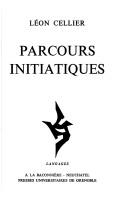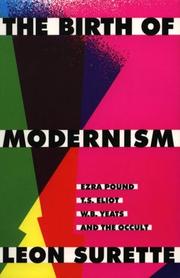| Listing 1 - 4 of 4 |
Sort by
|
Book
ISBN: 9780748627707 Year: 2015 Publisher: Edinburgh : Edinburgh University Press,
Abstract | Keywords | Export | Availability | Bookmark
 Loading...
Loading...Choose an application
- Reference Manager
- EndNote
- RefWorks (Direct export to RefWorks)

ISBN: 2825200034 2706101121 9782825200032 Year: 1977 Publisher: Neuchâtel
Abstract | Keywords | Export | Availability | Bookmark
 Loading...
Loading...Choose an application
- Reference Manager
- EndNote
- RefWorks (Direct export to RefWorks)
Thematology --- French literature --- Initiations in literature --- Theosophy in literature --- Littérature française --- History and criticism --- Histoire et critique --- 840 --- -Initiations in literature --- -Theosophy in literature --- -French literature --- Franse literatuur --- -Addresses, essays, lectures --- Addresses, essays, lectures --- Initiations in literature. --- Theosophy in literature. --- History and criticism. --- 840 Franse literatuur --- Littérature française --- 840 French literature. Literature in French --- French literature. Literature in French --- French poetry --- Bildungsromans, French. --- Littérature et mythe. --- Théosophie --- Romantisme (mouvement littéraire) --- Dans la littérature --- Fabre d'Olivet, Antoine, --- Saint-Martin, Louis-Claude de, --- Prévost, --- Stendhal, --- Hugo, Victor, --- Sand, George, --- Chateaubriand, François-René, --- Nerval, Gérard de, --- Baudelaire, Charles, --- Mallarmé, Stéphane, --- Breton, André, --- Prévost, Antoine François, --- Sand, George, 1804-1876 --- Nerval, Gérard de --- Mallarmé, Stéphane, --- Breton, André, --- Chateaubriand, François René de, --- French literature - History and criticism --- Littérature et mythe. --- Théosophie --- Dans la littérature --- Prévost, Antoine François, --- Nerval, Gérard de --- Chateaubriand, François René de,

ISBN: 0415955548 1306855454 113591561X 0415542596 0203933990 1135915628 9781135915629 9780203933992 9781135915575 1135915571 9781135915612 9780415955546 9780415542593 Year: 2008 Publisher: New York
Abstract | Keywords | Export | Availability | Bookmark
 Loading...
Loading...Choose an application
- Reference Manager
- EndNote
- RefWorks (Direct export to RefWorks)
When H. P. Blavatsky, the controversial head of the turn of the century movement Theosophy, defined ""a true Theosophist"" in her book The Key to Theosophy, she could have just as easily have been describing W. B. Yeats. Blavatsky writes, ""A true Theosophist must put in practice the loftiest moral ideal, must strive to realize his unity with the whole of humanity, and work ceaselessly for others."" Although Yeats joined Blavatsky's group in 1887, and subsequently left to help form The Golden Dawn in 1890, Yeats's career as poet and politician were very much in line with the methods set for
Theosophy in literature. --- Yeats, W. B. --- Knowledge --- Occultism. --- Yeats, William Butler --- D. E. D. I., --- Daemon Est Deus Inversus, --- Ganconagh, --- I., D. E. D., --- Йейтс, У. Б. --- Ĭeĭts, U. B. --- Йейтс, Уильям Батлер, --- Ĭeĭts, Uilʹi︠a︡m Batler, --- Weilian Batele Yezhi, --- Yeṭs, Ṿilyam Baṭler, --- יטס, יטלאם בטלר --- ייטס, ויליאם בטלר, --- 威廉,巴特勒,叶芝,

ISBN: 0773512438 9780773512436 0773509763 9786612856259 1282856251 0773563776 9780773563773 9781282856257 9780773509764 Year: 1994 Publisher: Montreal, Que. McGill-Queen's University Press
Abstract | Keywords | Export | Availability | Bookmark
 Loading...
Loading...Choose an application
- Reference Manager
- EndNote
- RefWorks (Direct export to RefWorks)
While W.B. Yeats' occultism has long been acknowledged, Surette is the first to show that Ezra Pound's early intimacy with Yeats was based largely on a shared interest in the occult, and that Pound's The Cantos is a deeply occult work. Surette argues that Pound's editing of T.S. Eliot's The Waste Land was not motivated primarily by stylistic concerns, as has generally been contended by the New Critics, but by thematic considerations. In fact, it was precisely because Eliot knew Pound to be well informed about the occult that he asked for Pound's assistance with The Waste Land.
Esoteric sciences --- Pound, Ezra --- Yeats, William B. --- Eliot, T.S. --- Yeats, William Butler --- Modernism (Literature) --- European literature --- Theosophy in literature. --- Occultism in literature. --- History and criticism. --- Pound, Ezra, --- Eliot, T. S. --- Yeats, W. B. --- D. E. D. I., --- Daemon Est Deus Inversus, --- Ganconagh, --- I., D. E. D., --- Йейтс, У. Б. --- Ĭeĭts, U. B. --- Йейтс, Уильям Батлер, --- Ĭeĭts, Uilʹi︠a︡m Batler, --- Weilian Batele Yezhi, --- Yeṭs, Ṿilyam Baṭler, --- יטס, יטלאם בטלר --- ייטס, ויליאם בטלר, --- 威廉,巴特勒,叶芝, --- Eliot, Thomas Stearns --- Pound, Ezra Loomis, --- Atheling, William, --- Bawnd, Izrā, --- Paount, Ezra, --- Pʻaundŭ, Ejŭra, --- Pavnd, Ezra, --- E. P. --- P., E. --- T. J. V., --- V., T. J., --- Pangde, --- Poet of Titchfield Street, --- Criticism and interpretation. --- Ai-lüeh-tʻe, --- Īliyūt, T. S., --- Elliŏtʻŭ, --- Eliot, Thōmas S., --- Eliot, Th. S., --- Eliot, Thomas Stern, --- Elyoṭ, T. S., --- Ėliot, Tomas Stirns, --- אליוט ט.ס --- אליוט, ת. ס. --- Pound, Ezra Loomis --- Atheling, William --- Bawnd, Izrā --- Paount, Ezra --- Pʻaundŭ, Ejŭra --- Pavnd, Ezra --- T. J. V. --- V., T. J. --- Pangde --- Poet of Titchfield Street
| Listing 1 - 4 of 4 |
Sort by
|

 Search
Search Feedback
Feedback About UniCat
About UniCat  Help
Help News
News